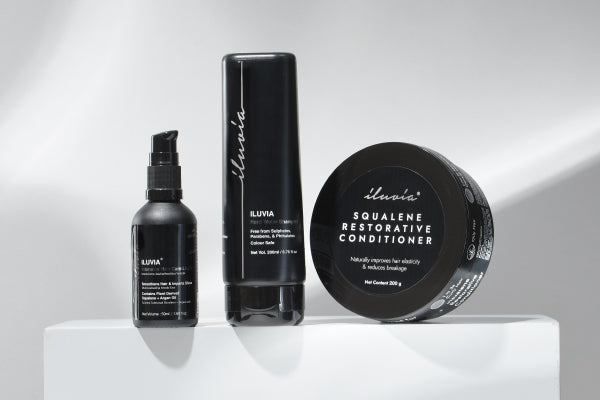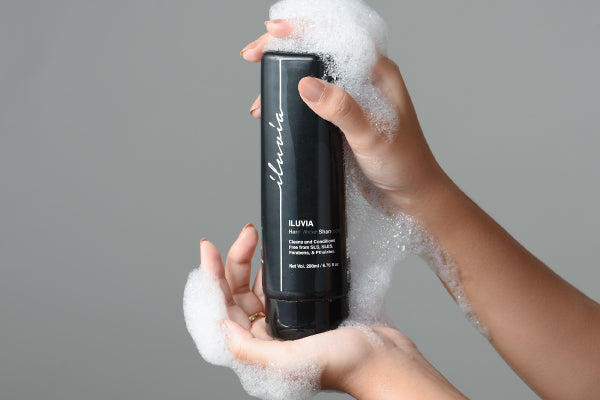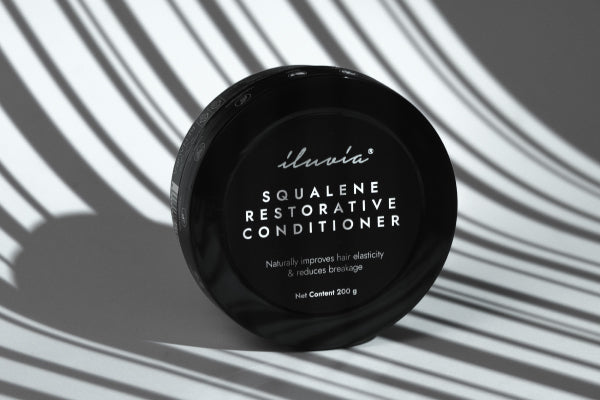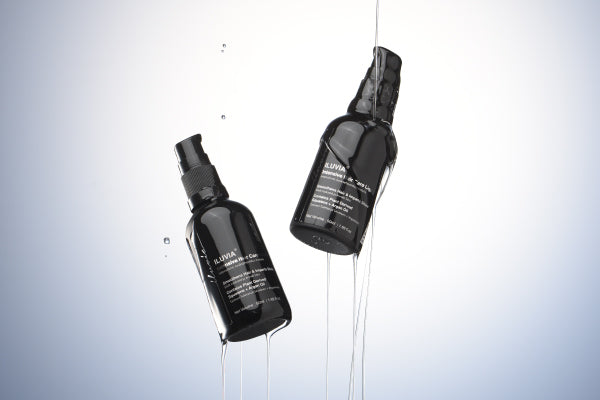If you've had enough of the endless battle against oily hair, you're in luck. We'll help you decode the telltale signs that your hair is tipping towards the oily spectrum. In this article, we dive deep into an oily hair guide that will revolutionise your hair care routine. No more battling constant oiliness or feeling self-conscious about your hair. Let’s look at how to keep your hair fresh all day.
What to Know About Sebum
Our scalps naturally produce sebum, an oily substance that helps keep our hair protected. However, for some people, the sebaceous glands work overtime, leaving us with oily hair that can be difficult to manage.
So, what exactly causes this overproduction of sebum? It turns out that genetics and hormones all play a role. It's believed that some people are genetically inclined to produce more sebum, while hormonal changes during puberty, menstruation and pregnancy can also lead to increased oiliness. Additionally, factors like stress can exacerbate the problem.
The effects of humidity and weather on your scalp might also impact the amount of sebum it produces. High humidity can cause an excess of these oils, while the dry winter air triggers your skin to overcompensate by producing extra oils to combat the dryness. Pollution also affects how much sebum is needed to protect your hair and scalp.
Identifying Oily Hair Signs
One of the most obvious signs of oily hair is, not surprisingly, excessive oiliness. If your hair looks greasy and unwashed even shortly after being washed, it clearly indicates that your scalp is producing an excess amount of sebum. The oil build-up can weigh down your hair, giving it a lifeless, flat appearance.
Another sign to watch out for is frequent scalp itchiness. Excessive sebum production often goes hand in hand with increased bacterial and fungal activity on the scalp. This can lead to irritation and itching, making it uncomfortable and bothersome to manage your hair.
In addition to oiliness and itchiness, oily hair tends to be prone to dandruff. The scalp's natural pH is slightly acidic, ranging from 4.5 to 5.5. A disturbed pH balance can result in an overabundance of bacteria and fungi, which exacerbates oiliness and may even cause dandruff on the scalp. These flakes may be visible on your scalp and hair, posing both aesthetic and hygiene concerns.
Lastly, you may notice that your hair becomes stringy or clumps together easily. The excess oil can cause your strands to stick together, resulting in a limp and unmanageable appearance. This can make styling your hair challenging and leave you frustrated with its lack of bounce and movement.
What Causes Oily Hair?
You may effectively address the underlying causes of oily hair by customising your oily hair treatment once you know them. So, let's explore the causes of oily hair and discover what might trigger your specific hair woes.
As mentioned above, one of the primary culprits behind oily hair is the overproduction of sebum, the natural oil your scalp produces. Although sebum is necessary to protect and maintain the condition of your hair, too much of it can give it a greasy look. While several factors can contribute to an overactive sebaceous gland, understanding your individual triggers can help you better manage and control oil production.
Another potential oily hair cause is improper cleansing. If you're not washing your hair frequently enough or using the wrong products, you may be inadvertently exacerbating the issue. When you don't cleanse your scalp thoroughly, excess oil and product build-up can accumulate, resulting in greasier hair. However, washing your hair too often removes natural oils, making your scalp create extra oil to compensate for it. Additionally, heavy, oil-based conditioners or styling products can contribute to an oily scalp. Opting for lightweight, oil-free alternatives can help alleviate the problem.
Another common cause for oily hair that goes under the radar is water quality, specifically hard water. Minerals dissolved in hard water, like calcium and magnesium, are deposited on the scalp and hair. The mineral build-up eventually dries out the scalp, causing an overproduction of sebum, leading to an oily or greasy scalp and weighed-down hair. It also interferes with how well hair products work.
Your habits and lifestyle may also influence your hair's oiliness. Touching your hair frequently, especially with unwashed hands, can transfer oils and dirt onto your strands, making them appear greasier.
Overuse of heat-styling products can increase the amount of oil your scalp produces as a defence mechanism. Striking a balance between styling and giving your hair breaks from heat can help regulate oil production.
Lastly, diet can impact the oiliness of your hair. Consuming a diet high in greasy, fried foods or excessive sugar can potentially contribute to excess oil production in your scalp. Consider incorporating more fruits, vegetables and lean proteins into your diet to promote healthier hair and scalp.
By understanding the various oily hair causes, you can take steps to fight this issue and achieve a healthier, more balanced scalp.
Combating Oily Hair: The Expert-Backed Hair Guide
To ensure that your scalp stays oil-free and your hair remains fresh and voluminous, it’s important to choose a holistic hair care routine that is tailored to cleanse, strengthen and protect your hair and scalp.
The iluvia Complete Professional System is the perfect 3-step oily hair treatment for those with this hair type.

Start with the Hard Water Shampoo, made with chelating agents to attach to metal ion deposits and remove them while gently washing the hair and scalp. It stops these metal ions from being deposited any further. In addition to fighting hair damage, the deep-cleansing shampoo provides the hair extra lift and volume. It also keeps the scalp from becoming irritated and flaky by preserving its natural pH balance, leaving the hair feeling softer, smoother and silkier.

After shampooing, use the Squalene Restorative Conditioner. The deep conditioning formula is enriched with Olive Squalene, which increases softness, elasticity, strength and volume, while the pure Moroccan Argan Oil tames flyaways and decreases frizz. In addition to strengthening and detangling hair, the conditioner adds another level of protection against future damage.

Finally, to give your hair a final layer of protection, a drop of the Intensive Hair Care Serum will form an insulating layer around it. The serum with Moroccan Argan Oil, Baobab Seed Oil and Olive Squalene Oil not only repairs the hair's natural lipid barrier but also leaves hair feeling softer, smoother, frizz-free and easier to maintain. Additionally, the serum is lightweight and doesn't cause the hair to get heavy or lose volume.

Maintaining a consistent hair care routine will go a long way in freeing your hair of excess oil, shielding it from damage and strengthening it to give you the hair of your dreams.
With this newfound confidence-boosting hair care routine, it's time to revel in the joy of oil-free hair and say hello to a new you.
Shop the Complete Professional System at iluviapro.com.
